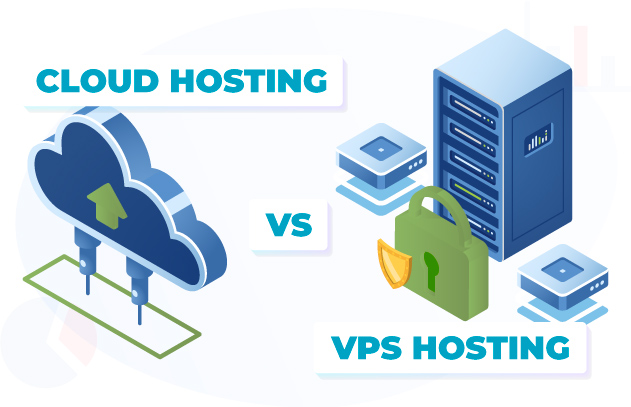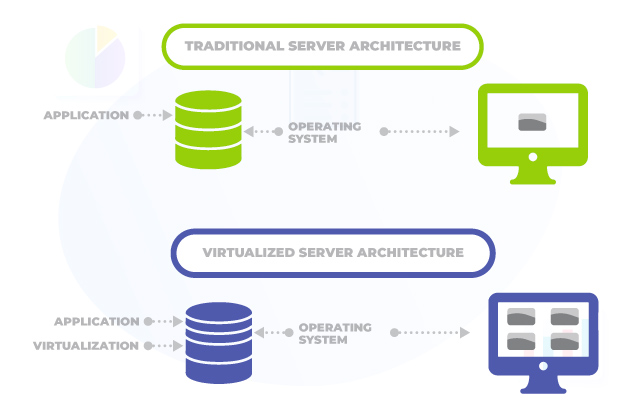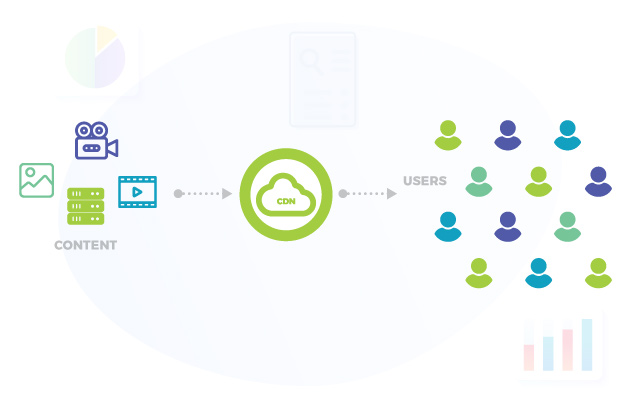
Selecting the ideal hosting solution is a vital decision for any website owner, with two popular alternatives being cloud hosting and VPS hosting.
Each option boasts distinct advantages, catering to various website types and business needs.
To assist you in making an informed choice, we have invested countless hours researching cloud and VPS hosting services, breaking down their functionality and distinguishing features.
Typically, as a website outgrows the capabilities of other hosting services, transitioning to either cloud or VPS hosting becomes essential.
Both shared and dedicated hosting surpasses the speed of shared hosting due to the allocation of dedicated resources.
Let’s delve into a detailed comparison to determine which hosting solution best aligns with your requirements.
Table Of Contents
Cloud Hosting Vs VPS Hosting: What’s The Difference?
The difference between cloud and virtual private servers is that cloud hosting uses multiple physical servers with the ability to scale resources when needed.

VPS hosting has one dedicated server with limited resources.
Shared and dedicated hosting both use virtual servers with dedicated hosting resources.
Generally, VPS hosting is better for medium-sized websites while cloud hosting is better for corporate websites.
Overall, the core technology is the same, but the cloud is spread out across a network of data centers, while a regular VPS is only hosted on one data center.
Cloud Hosting Explained
The word “cloud” gets thrown around a lot, and it’s often used for any service that hosts files on a remote server, instead of a local single physical server.

Cloud hosting can be a little tough to wrap your head around because it describes a wide range of services and technologies.
Generally speaking, the purpose of cloud hosting is to remotely access a pool of hardware resources from multiple data centers.
Bear in mind that servers that are shared are not the same as CDNs (Content Delivery Networks) and I’ll explain more about that later on.
Advantages Of The Cloud
Cloud hosting is extremely reliable because if one data center has an issue, one of the others on the network can pick up the slack, also called redundancy.
Another benefit of cloud hosting is scalability.

You can easily rent more dedicated servers or resources if you require more resources.
Most of the time you only pay for what you use.
Cloud hosting is the preferred choice for applications that have bandwidth and processing requirements that fluctuate.
Another way to think of that is it’s easier to vertically scale a cloud server.
In other words, your website or application will almost never see downtime on a cloud hosting plan.

Cloud hosting is the preferred choice for large websites such as magazines, news outlets, search engines, social networks, online stores, and many others.
Bear in mind, that every hosting providers offer its own cloud hosting packages with a wide range of features.
Cloud hosting costs are a bit tricky.
For example, some servers will charge you for bandwidth use or per minute of use.
Most of the big-name cloud hosting providers will offer pay-as-you-go plans which are convenient because you only pay for the resources you use.
Cloud Benefits:
Great performance
Server hosting on multiple data centers
Can be vertically scaled as needed
Most cloud hosts provide pay-as-you-go plans
Extremely reliable
Dedicated hosting resources
Great security

VPS Hosting Overview
A VPS (Virtual Private Server) works the same way as cloud hosting but without multiple servers or a pay-as-you-go plan.

With a VPS you have dedicated resources on one partition and a single physical server.
For example, your virtual private server could have 1 CPU core, 1 GB of RAM, and 20 GB of storage.
You also have root access and can host a number of applications and operating systems, including multiplayer game dedicated servers.
You’re not strictly limited to certain applications.
The downside is your server is one small piece of a larger physical server, and if the main server goes down, then your plan will go down too.
However, most VPS providers like Kamatera, Hostwinds, Hostinger, KnowHost are very secure, and your website is unlikely to go down.

Typically, there’s no user interface on a VPS server.
You will have to enter command lines, usually via a Linux terminal.
There’s also the option to purchase a managed VPS-hosting where a technician will set up the services you need.

However, certain hosting companies do provide a user interface on their VPS servers.
Most VPS servers offer a limited amount of resources, and if you use more than the amount allocated, you need to upgrade to a new plan.
Unlike cloud or shared servers, VPS servers don’t automatically scale on a pay-as-you-go model.
Generally, VPS servers are ideal for people with small to medium-sized websites or applications where you need dedicated resources and full hosting control.

Most small websites don’t have very high bandwidth requirements so you won’t have to worry about that problem.
VPS servers are also much cheaper than cloud hosting because you’re only buying one server.
Website owners usually move their websites to a dedicated virtual private server after they outgrow their shared hosting plans.
For a complete breakdown of how a VPS works, read our detailed VPS guide.
VPS Benefits:
Better performance than shared hosting
Total control over your server via root access

Dedicated resources
Option to install any number of applications
Great security
How Virtualization Technology Works
Cloud hosting and VPS-hosting both use virtualization technology.
It’s a software-based technology that allows you to create a layer over computer hardware.

I’ll quickly explain how it works.
In simple terms, you can think of a virtual server as a partition on a hard drive, a digital way to split a hard drive into separate folders.
Hosting providers use that technology to create private sections with dedicated resources that they rent out to users.
For example, a hosting company buys a whole server, complete with CPU, RAM, and storage.
It then splits the resources into multiple virtual partitions with a small portion of the main resources.
Customization
It customization process for cloud and VPS-hosting is a little different. Before you buy a plan, it’s best to know what you’re getting into.
Customizing A Cloud Hosting Server
Most cloud hosting servers are bare-bones with no graphical interface or operating system and the commands need to be typed directly with command lines.

However, some do include a control panel with a list of applications and other onboarding services. For example, SiteGround offers a WordPress migration tool that’ll move your WordPress website to the cloud with a few simple steps.

For other applications, It can be tricky to set up a cloud server on your own, so web hosting providers offer managed cloud hosting services.
With a managed cloud hosting server, a technician will run all the commands on the dedicated server to install the applications you want and get everything ready for you.
On that note, many of these servers allow you to install control panels like cPanel but you have to buy a license or pay for an add-on.
Do Cloud Servers Offer Root Access?
Not all cloud servers offer root access. It varies from the web host, but most big-name hosting providers do not provide root access.
For example, SiteGround does not provide root access on any of its servers.
Customizing A VPS Server
Typically, with a VPS server, you will have complete control.

There are usually two types of VPS servers: unmanaged and managed.
As mentioned earlier, an unmanaged VPS will provide you with a bare-bones server with a Linux terminal for installing applications.
Most VPS servers will provide you with root access, so you’re in total control of your server.
Managed VPS servers are preferred for non-experts because they are done-for-you packages.
Most web hosting providers will offer managed VPS servers for a variety of applications, such as WordPress, or even multiplayer game servers.
Once again, the exact customization options will vary depending on the hosting company.
VPS Resource Limitations
Once again, a VPS comes with resource limitations (CPU, RAM, storage, etc).

They don’t automatically scale vertically like a cloud or shared servers.
So you need to consider the resource requirements of your project.
Normally, simple WordPress websites don’t have very high resource requirements, so a VPS should be able to handle the workload with no issues.
For example, if your website is suddenly hit with a massive traffic spike, the virtual server might not have enough resources to handle the workload fast enough.
To solve that issue, you will need to upgrade to a VPS that has more resources.
Except by then, the traffic spike might be over, and you will no longer need those extra resources.
Is A Cloud Server The Same As A CDN?
Cloud servers are not the same as CDNs (content delivery networks) but they’re often confused for them.
Essentially, a CDN makes a cache of static files and hosts them in key locations around the world so visitors can access the files from the data center closest to them.

CDNs improve the overall performance of websites that use a lot of static content, such as images, files, text, and whatnot.
For optimal performance, it’s recommended to use a CDN with your cloud server.
The process of how CDNs operate is crucial to comprehend their role.
When a user requests content (like a video or image) from a website, the CDN redirects the request from the originating website’s server to a server in the CDN that is closest to the user and delivers the cached content from there.
This reduces the distance that the data has to travel, which in turn reduces latency, and therefore improves site loading speed, providing a better user experience.
On the other hand, a cloud server is essentially a virtual server that runs in a cloud computing environment.
Cloud servers can be configured to provide similar features as a typical physical server. Unlike traditional servers, which are confined to the physical capacity of their hardware, cloud servers can be scaled up and down instantly based on your needs.
This means that you can easily increase your capacity during peak traffic times to prevent your website from going down and decrease it during off-peak times to save money.
So, while a CDN is primarily concerned with delivering content in the quickest, most efficient manner, a cloud server’s main function is to provide a flexible, scalable environment for hosting applications and websites. Both play different but important roles in ensuring a smooth, efficient online experience for users.
The relationship between CDNs and cloud servers can be highly symbiotic. Combining a CDN with a cloud server can lead to high-performing, resilient digital services.
This is because while the cloud server is efficiently managing and distributing the resources, the CDN ensures the data has a short journey to the end user, further enhancing the user’s experience. Therefore, understanding their distinct roles and learning how to leverage both effects can be beneficial for anyone managing a website or an online service.
Which Is Faster VPS Or Cloud Hosting?
Cloud hosting is faster than VPS because it uses resources from multiple servers and it can automatically allocate more resources when needed.

However, many factors can affect the speed, such as the web host’s infrastructure, data centers, hardware, and whatnot.
Some cloud or shared servers are slower than virtual private servers.
In most cases, the performance is about the same, although the cloud has a slight lead.
Further dissecting the speed question between VPS and cloud hosting, one must take into consideration the scalability, reliability, and redundancy that cloud hosting provides.
Since it pools resources from multiple servers, the allocation of resources such as bandwidth, storage, and processing power is not restricted to the confines of a single machine as in the case of VPS.
This flexibility allows cloud hosting to accommodate sudden traffic surges efficiently, making it ideal for websites with unpredictable traffic patterns.
Nevertheless, the ‘real-world performance between a VPS and cloud hosting may not always be significantly different, especially for small to medium-sized websites. A well-configured VPS with sufficient resources can handle most websites’ demands efficiently.
Also, a VPS tends to offer more control over the server environment, allowing more experienced users to fine-tune the server for optimal performance.
Contrarily, a cloud server’s multi-server setup ensures that your site remains operational even if one of the servers goes down, a feature known as redundancy. This can be a significant advantage, especially for critical business applications where any downtime could lead to substantial losses.
It is also important to note that while the speed and performance of both VPS and cloud hosting can be influenced by the underlying hardware, they are also significantly affected by the software stack.
Therefore, utilizing the latest versions of server software and optimizing your website’s code can result in improved performance, regardless of your hosting type.
Security
In most cases, the security of both cloud and VPS is top-notch hosting with multiple levels of protection and you don’t need to worry about it.
With a VPS, you can install your own custom security options with firewalls, etc.

One major point for the cloud is redundancy, if a single physical server fails, there are plenty of backups to keep it online.
The downside is if you make a mistake with configuring your firewalls you could leave your virtual server vulnerable.
For that reason, I recommend using managed VPS hosting because a technician will take care of all the security measures.
Once again, the level of security comes down to the quality of the hosting provider.
Price
It’s difficult to compare the prices of these two options because they vary dramatically.
Additionally, managed servers are more expensive than self-managed.
Certain companies only provide managed servers while others only provide self-managed.
For example, SiteGround only offers managed cloud plans, starting from $100 a month.

Meanwhile, Hostinger only offers self-managed cloud servers.
However, for small websites, you can find beginner VPS plans that are often much cheaper than cloud servers.
Granted the resources will be heavily limited but they can be enough for simple websites.
Is VPS Hosting Cheaper Than Cloud Hosting?
Yes, VPS hosting is almost always cheaper than cloud hosting because it’s a single server.
VPS Vs Cloud Hosting: What’s Right For Your Website?
To decide which options are better for your website, it’s best to take a look at your bandwidth usage over the last few months.
If your bandwidth usage fluctuates dramatically from month to month, a cloud server can balance the workload.
However, if your bandwidth is relatively stable, a VPS is the better choice.
Just remember, that both of these hosting options use the same virtual technology, and you’ll need to know how to configure them.
I personally recommend moving from shared hosting to a VPS and then from there, you can consider the cloud for more scalability.
Most of the time, a good VPS with a moderate amount of dedicated resources is enough to host most websites with decent performance.
Not sure what is the best web hosting provider? Take a look at our 7 recommendations for small business owners.

